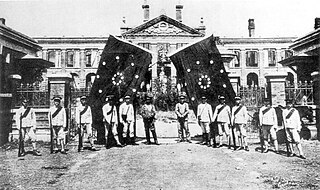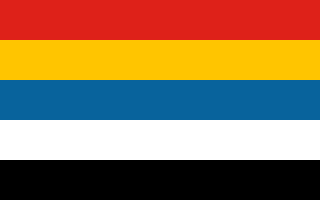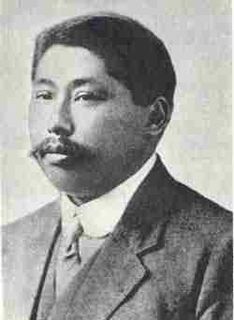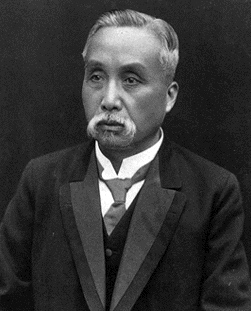
The Wuchang Uprising was an armed rebellion against the ruling Qing dynasty that took place in Wuchang, Hubei, China on 10 October 1911, which was the beginning of the Xinhai Revolution that successfully overthrew China's last imperial dynasty. It was led by elements of the New Army, influenced by revolutionary ideas from Tongmenghui. The uprising and the eventual revolution directly led to the downfall of the Qing dynasty with five centuries of imperial rule, and the establishment of the Republic of China (ROC), which commemorates the anniversary of the uprising's starting date of 10 October as the National Day of the Republic of China.

The Xinhai Revolution, also known as the Chinese Revolution or the Revolution of 1911, was a revolution that overthrew China's last imperial dynasty and established the Republic of China (ROC). The revolution was named Xinhai (Hsin-hai) because it occurred in 1911, the year of the Xinhai (辛亥) stem-branch in the sexagenary cycle of the Chinese calendar.

Dai Jitao or Tai Chi-t'ao was a Chinese journalist, an early Kuomintang member, and the first head of the Examination Yuan of the Republic of China. He is often referred to as Dai Chuanxian or by his other courtesy name, Dai Xuantang.
In the first five years of the People's Republic of China, the Central People's Government of the People's Republic of China was the supreme organ for exercising state power when the National People's Congress was not in session, according to Article 12 of the Common Program of the Chinese People’s Political Consultative Conference .

Local elections were held in Taiwan on 3 December 2005 to elect magistrates of counties and mayors of cities, councillors in county/city councils and mayors of townships/cities, known as the three-in-one elections, on 10 June 2006 to elect representatives in township/city councils and village chiefs, on 9 December 2006 to elect mayors and councillors of special municipalities, and on 30 December 2006 to elect village chiefs in Taipei City.
The First Legislative Representative Election of the Republic of China, and the preceding 1947 National Assembly Election were the Republic of China's first public direct elections since its founding. At the time most of China's territory was under the control of the Government of the Republic of China, using a direct voting system elected 759 Legislative Representatives. Using the Republic's then 461 million population to calculate, on average 600,000 people elected one representative in the Legislature. The election along with the one held for the National Assembly also made China the largest democracy at the time.

Wang Yitang was a politician and military leader in the Qing Dynasty and Republic of China. He belonged to the Anhui clique and formed the Anfu Club (安福俱樂部). Later he became an important politician in the Provisional Government of the Republic of China and the Reorganized National Government of the Republic of China. His former name was Zhiyang (志洋) and his courtesy names were Shenwu (慎吾) and Shengong (什公). Later, his name was changed to Geng (賡) while his courtesy name was changed to Yitang (一堂). He was also known by his art name Yitang (揖唐). He was born in Hefei, Anhui.

The Provisional Government of the Republic of China was a provisional government established during the Xinhai Revolution by the revolutionaries in 1912. After the success of the Wuchang uprising, revolutionary provincial assembly representatives held a conference in the district of Wuchang, China, which framed the organizational outline of the Provisional Government.

Local elections were held in Taiwan on 1 December 2001 to elect magistrates of counties and mayors of cities, on 26 January 2002 to elect councillors in county/city councils and mayors of townships/cities, on 8 June 2002 to elect representatives in township/city councils and village chiefs, and on 7 December 2002 to elect mayors and councillors of special municipalities.

The 1911 Republic of China Provisional Presidential and Vice-Presidential Election was the election held on 29 December 1911 during the Xinhai Revolution for the First Provisional President and Vice President of the Provisional Government of the Republic of China. Sun Yat-sen and Li Yuan-hung were elected as President and Vice-President respectively. Sun sworn in at midnight on 1 January 1912 and declared the official establishment of the Republic of China.

The 1913 Republic of China Presidential and Vice-Presidential Elections were the election held on 6 and 7 October 1913 in Beijing for the first official President and Vice President of the Republic of China respectively. The incumbent Yuan Shikai and Li Yuanhong were elected by two houses of the National Assembly.

The 1916 Republic of China Vice-Presidential By-Election were a by-election held on 30 October 1916 in Beijing for the Vice President of the Republic of China due to the vacancy left by incumbent Li Yuanhong as he replaced Yuan Shikai as president after Yuan's sudden death. Feng Guozhang of the Zhili clique won over Lu Rongting of the Old Guangxi Clique in the election.

The 1918 Republic of China Presidential and Vice-Presidential Elections were the elections held on 4 September 1918 in Beijing for the second term of the President of the Republic of China. Xu Shichang was elected by two houses of the National Assembly which were controlled by the Anfu Club formed in the National Assembly election in the same year.

The 1923 Republic of China Presidential Election was the election held on 5 October 1923 in Beijing for the third term of the President of the Republic of China. Zhili warlord Cao Kun won the election through bribery.

Ju Zheng was a Chinese politician who was a leader in the Chinese Nationalist Party, or KMT, in the 1930s and 1940s. As president of the Judicial Yuan, he administered China's court system from 1932 to 1948. He ran in the presidential election of 1948 as the token opponent of Chiang Kai-shek. He was also known by his courtesy name Juesheng (Chueh-sheng).

The 14th President and Vice President election of the Republic of China was held in Taiwan on 16 January 2016. Democratic Progressive Party (DPP) candidate Tsai Ing-wen with her independent running mate Chen Chien-jen won over Eric Chu of the Kuomintang (KMT) and James Soong of the People First Party (PFP). Tsai became the first female president in Taiwan, as well as the Chinese-speaking world.

Local elections were held on 24 November 2018 in Taiwan, to elect county magistrates, county (city) councilors, township mayors, township councilors and chiefs of village (borough) in 6 municipalities and 16 counties (cities). Elected officials would serve a four-year term. Polling stations were open from 08:00 to 16:00 on the election day.

By-elections for the Ninth Legislative Yuan were held in 2019, two on 27 January and four on 16 March, at Taiwan to elect 6 of the 113 members of the Legislative Yuan for the remaining term until 2020.
Local elections in Taiwan, also known as nine-in-one elections since 2014, are held to elect local officials and councillors in Taiwan.
This is a list of electoral districts for local council elections in Taiwan.
















